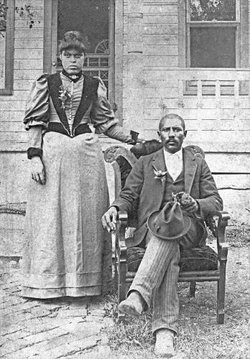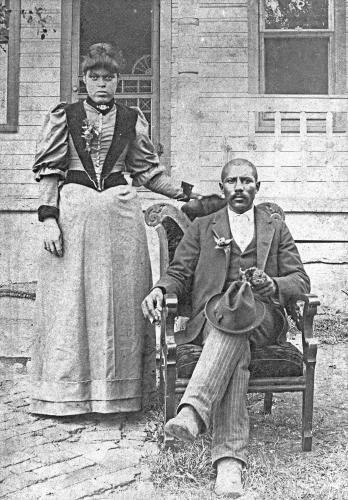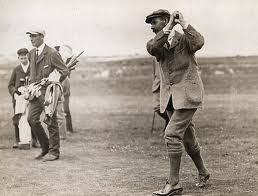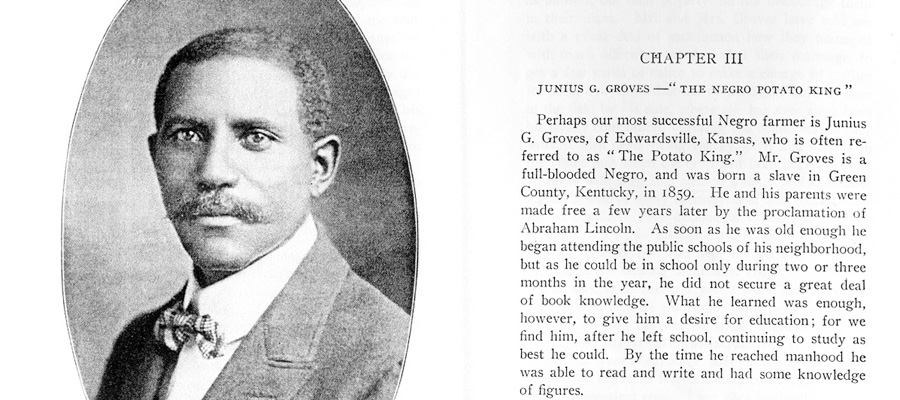In 1880 he married Matilda Emily Stewart from Kansas City, Missouri, and she worked by his side in the field. After his second year, Groves had twenty acres, and in his third year Groves landed ten more acres and a cabin across from Lake of the Forest. That same year he bought 80 acres from a Native American for $500. Subsequent acquisitions included a sawmill, and five adjoining farms, making for total holdings of more than 760 acres. Beside potatoes, he had apple, peach and pear orchards and a vineyard. In 1902, Groves was named by the US Dept of Agriculture the Potato King of the World for beating his closest competitor on the planet by 11,500 bushels.
Groves suffered financial setbacks in the 1920s, including a loss of around $90,000 in a cattle venture. Groves built three mansions and all of them burned down "mysteriously", the last in 1968. He was a well known philanthropist and every year gave a portion of his yearly crop to a local hospital. Junius and Matilda had several children: Charles A, Walter P, Fred E, Ida M, Ora A, Lillian A, Junius Jr, Sylvester, Ethia, John Arthur, Cornelius Vivian, and Theodore W. The couple's twelve surviving children (out of fourteen births) helped with the farm and family holdings.
Groves was only able to attend school for a few months each year as a child. But he developed a life long thirst for learning. On his own, he studied agricultural science for over 40 years. Besides producing potatoes on his own farms, by 1900 Groves was buying and shipping potatoes, fruits and vegetables extensively throughout the United States, Mexico and Canada. The family owned a general merchandise store in Edwardsville, possessed in mines in Indian Territory and Mexico, stock in Kansas banks, and majority interest in the Kansas City Casket and Embalming Company. Junius Groves co-founded the State Negro Business League and later served as its President. He also founded the Pleasant Hill Baptist Church Society in 1886. He was elected secretary of the Kaw Valley Potato Association in 1890 and Vice President of the Sunflower State Agricultural Association in 1910, we well as co-founder of both organizations in those years.
Junius Groves was wealthier than most whites and undoubtedly encountered racism. His response was to provide economic opportunities to blacks and whites with a particular emphasis on uplifting his race. During the busy farming season, Grove employed up to fifty mostly black laborers. He founded Groves Center, an African American community near Edwardsville in the early 1900s. He also established a golf course for African Americans, perhaps the first in the United States. His name is on the original deed of the historic Edwardsville Colored Cemetery, which some in the city refer to as the Stoney Point Cemetery. He was an original founder of the Franklin Cemetery, where he and many of his family members are buried.
Junius Groves was one of the wealthiest African Americans in the nation by the first decade of the 20th century. His holdings were estimated to be worth $80,000 in 1904 and $300,000 by 1915. The Groves family mansion, a 22 room brick home, complete with electric lights, two telephones, and hot and cold running water in all of the bedrooms, was the largest in the area and had its own railroad spur. Junius Groves died in Edwardsville on August 17, 1925. Newspaper accounts reported that there were more than 300 automobiles at his funeral.
In 2007, Groves was honored by his descendants, the Votow Colony Museum, an organization honoring the Exocusteres and their descendants, and the city of Edwardsville. He was also inducted into the Bruce W. Watkins Cultural Heritage Center Hall of Fame in nearby Kansas City, Missouri.
Sources:
Booker T. Washington, The Negro in Business (Boston: Hertel, Jenkins & Co., 1907, reprinted Chicago: African American Press, 1969)
Anne Hawkins, "Hoeing Their Own Row: Black Agriculture and the Agrarian Ideal in Kansas, 1880-1930," Kansas History 22 (Autumn 1999)
Angela Doyle Radicia, "Junius Groves and the Community of Groves Center," unpublished paper, Mid-America conference on History, Tulsa, Oklahoma, Sep 2007; Votow Colony Museum
____________________________________________________________August 21, 1925 Advocate Kansas City, Kansas
COLORED POTATO KING DIES OF HEART DISEASE
He Was Called Richest Colored Man in Kansas
Mr. Junius G. Groves died of heart disease at his superfine residence, which cost #22,000, at Edwardsville, Kansas, Monday, August 17. He was called the richest colored man in Kansas. One year he produced 72,150 bushels of potatoes which was 12,150 more bushels than any other grower in the world. He is survived by his widow, Mrs. Emily Groves and eleven children, eight sons and three daughters. All the colored people and thousands of white people condole with the family.
___________________________________________________________
August 28, 1925 Advocate Kansas City, Kansas
J. G. GROVES FUNERAL
The largest funeral ever in Edwardsville was of Junius Groves, on Sunday August 23, on his vast lawn. Over 3000 people attended. Rev. J. R. Richardson preached the sermon. Dr. Unthank acted Master of Ceremonies. Dr. Soames, grandmaster of Masons and Prof. C. M. gave addresses. Mr. Walter Groves paid a glowing trip to his father and the choir, on a raised platform sang with Mrs. C Graves as pianist. The thousands had chairs under the beautiful trees. Lawyer Guy of Topeka, made glowing remarks. The Masonic lodge turned out in a body and the whole funeral lasted from 11 a.m. to 3:30 p.m. All true people of all races sympathize deeply in the loss of the greatest farmer of the race.
In 1880 he married Matilda Emily Stewart from Kansas City, Missouri, and she worked by his side in the field. After his second year, Groves had twenty acres, and in his third year Groves landed ten more acres and a cabin across from Lake of the Forest. That same year he bought 80 acres from a Native American for $500. Subsequent acquisitions included a sawmill, and five adjoining farms, making for total holdings of more than 760 acres. Beside potatoes, he had apple, peach and pear orchards and a vineyard. In 1902, Groves was named by the US Dept of Agriculture the Potato King of the World for beating his closest competitor on the planet by 11,500 bushels.
Groves suffered financial setbacks in the 1920s, including a loss of around $90,000 in a cattle venture. Groves built three mansions and all of them burned down "mysteriously", the last in 1968. He was a well known philanthropist and every year gave a portion of his yearly crop to a local hospital. Junius and Matilda had several children: Charles A, Walter P, Fred E, Ida M, Ora A, Lillian A, Junius Jr, Sylvester, Ethia, John Arthur, Cornelius Vivian, and Theodore W. The couple's twelve surviving children (out of fourteen births) helped with the farm and family holdings.
Groves was only able to attend school for a few months each year as a child. But he developed a life long thirst for learning. On his own, he studied agricultural science for over 40 years. Besides producing potatoes on his own farms, by 1900 Groves was buying and shipping potatoes, fruits and vegetables extensively throughout the United States, Mexico and Canada. The family owned a general merchandise store in Edwardsville, possessed in mines in Indian Territory and Mexico, stock in Kansas banks, and majority interest in the Kansas City Casket and Embalming Company. Junius Groves co-founded the State Negro Business League and later served as its President. He also founded the Pleasant Hill Baptist Church Society in 1886. He was elected secretary of the Kaw Valley Potato Association in 1890 and Vice President of the Sunflower State Agricultural Association in 1910, we well as co-founder of both organizations in those years.
Junius Groves was wealthier than most whites and undoubtedly encountered racism. His response was to provide economic opportunities to blacks and whites with a particular emphasis on uplifting his race. During the busy farming season, Grove employed up to fifty mostly black laborers. He founded Groves Center, an African American community near Edwardsville in the early 1900s. He also established a golf course for African Americans, perhaps the first in the United States. His name is on the original deed of the historic Edwardsville Colored Cemetery, which some in the city refer to as the Stoney Point Cemetery. He was an original founder of the Franklin Cemetery, where he and many of his family members are buried.
Junius Groves was one of the wealthiest African Americans in the nation by the first decade of the 20th century. His holdings were estimated to be worth $80,000 in 1904 and $300,000 by 1915. The Groves family mansion, a 22 room brick home, complete with electric lights, two telephones, and hot and cold running water in all of the bedrooms, was the largest in the area and had its own railroad spur. Junius Groves died in Edwardsville on August 17, 1925. Newspaper accounts reported that there were more than 300 automobiles at his funeral.
In 2007, Groves was honored by his descendants, the Votow Colony Museum, an organization honoring the Exocusteres and their descendants, and the city of Edwardsville. He was also inducted into the Bruce W. Watkins Cultural Heritage Center Hall of Fame in nearby Kansas City, Missouri.
Sources:
Booker T. Washington, The Negro in Business (Boston: Hertel, Jenkins & Co., 1907, reprinted Chicago: African American Press, 1969)
Anne Hawkins, "Hoeing Their Own Row: Black Agriculture and the Agrarian Ideal in Kansas, 1880-1930," Kansas History 22 (Autumn 1999)
Angela Doyle Radicia, "Junius Groves and the Community of Groves Center," unpublished paper, Mid-America conference on History, Tulsa, Oklahoma, Sep 2007; Votow Colony Museum
____________________________________________________________August 21, 1925 Advocate Kansas City, Kansas
COLORED POTATO KING DIES OF HEART DISEASE
He Was Called Richest Colored Man in Kansas
Mr. Junius G. Groves died of heart disease at his superfine residence, which cost #22,000, at Edwardsville, Kansas, Monday, August 17. He was called the richest colored man in Kansas. One year he produced 72,150 bushels of potatoes which was 12,150 more bushels than any other grower in the world. He is survived by his widow, Mrs. Emily Groves and eleven children, eight sons and three daughters. All the colored people and thousands of white people condole with the family.
___________________________________________________________
August 28, 1925 Advocate Kansas City, Kansas
J. G. GROVES FUNERAL
The largest funeral ever in Edwardsville was of Junius Groves, on Sunday August 23, on his vast lawn. Over 3000 people attended. Rev. J. R. Richardson preached the sermon. Dr. Unthank acted Master of Ceremonies. Dr. Soames, grandmaster of Masons and Prof. C. M. gave addresses. Mr. Walter Groves paid a glowing trip to his father and the choir, on a raised platform sang with Mrs. C Graves as pianist. The thousands had chairs under the beautiful trees. Lawyer Guy of Topeka, made glowing remarks. The Masonic lodge turned out in a body and the whole funeral lasted from 11 a.m. to 3:30 p.m. All true people of all races sympathize deeply in the loss of the greatest farmer of the race.
Family Members
-
Charles A. Groves
1881–1912
-
![]()
Walter Purtee Groves
1882–1970
-
![]()
Frederick Elzra Groves
1883–1968
-
![]()
Ida Groves Woods
1885–1939
-
![]()
Ora Andrew Groves
1886–1970
-
![]()
Lillian Ann Groves
1888–1904
-
![]()
Junius George Groves Jr
1890–1965
-
![]()
Sylvester J Groves
1891–1935
-
![]()
Etnia E Flemming
1895–1961
-
![]()
Cornelius Vivian "Chick" Groves
1898–1969
Sponsored by Ancestry
Advertisement
Records on Ancestry
Advertisement



















